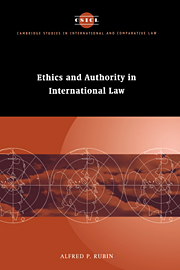Book contents
- Frontmatter
- Contents
- Preface
- Acknowledgments
- List of abbreviations
- Table of cases
- Table of statutes
- Table of treaties
- 1 Introduction
- 2 The international legal order
- 3 Theory and practice come together
- 4 Putting it together
- 5 Implications for today
- Bibliography
- Index
- CAMBRIDGE STUDIES IN INTERNATIONAL AND COMPARATIVE LAW
Preface
Published online by Cambridge University Press: 14 September 2009
- Frontmatter
- Contents
- Preface
- Acknowledgments
- List of abbreviations
- Table of cases
- Table of statutes
- Table of treaties
- 1 Introduction
- 2 The international legal order
- 3 Theory and practice come together
- 4 Putting it together
- 5 Implications for today
- Bibliography
- Index
- CAMBRIDGE STUDIES IN INTERNATIONAL AND COMPARATIVE LAW
Summary
This monograph had two inspirations. Between 1963 and late 1965 I was the junior attorney in the United States Department of Defense General Counsel's office principally responsible for legal questions involved in the Far Eastern entanglements of the United States military. We were not consulted often regarding our Viet Nam involvement. But at the annual meeting of the American Society of International Law in April 1973, some seven years after I had left that office, I was asked to serve on a panel to discuss some aspects of the laws of war as applied (or not) in Viet Nam. One of the other panelists asked some pointed questions about the United States not arresting and trying before its own courts various officials of the Government of South Viet Nam who had been photographed committing what seemed obvious violations of the “positive” laws of war (i.e., those laws adopted through an exercise of human discretion; in this case at least in part by treaty). When I replied that neither general international law nor the pertinent treaties gave the United States the jurisdiction to apply those rules to foreigners acting in their own country, he asserted that the codifying treaties gave all countries the authority to try anybody for war crimes committed anywhere; that “universal offenses” implied “universal jurisdiction” to adjudicate and enforce; thus that violators of the acknowledged laws of war could be legally punished by any country's tribunal anywhere.
- Type
- Chapter
- Information
- Ethics and Authority in International Law , pp. xi - xvPublisher: Cambridge University PressPrint publication year: 1997
- 1
- Cited by

